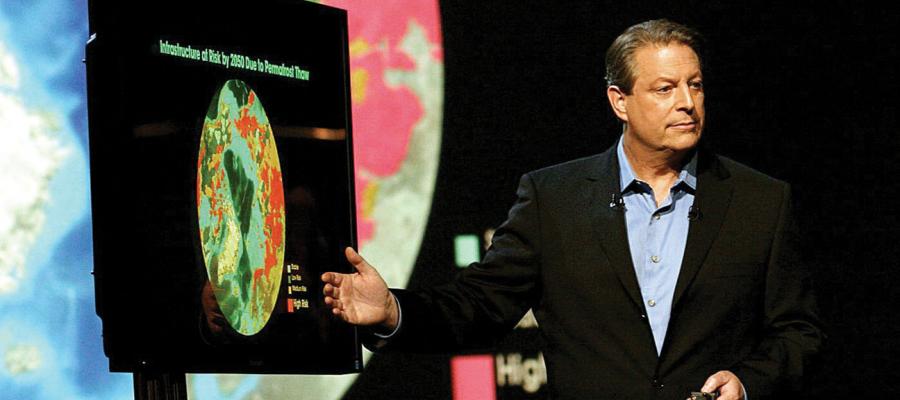Saints, Heroes, and Schmucks Like Me
02
Sep 2005
Thanks to Susan Wolf for an interesting discussion. The episode certainly prompted lots of response from listeners. We must have set a record for questions submitted via e-mail. There were also more callers than we could get to. Susan has a point. There is more to living well than slavishly and single-mindedly devoting oneself to moral perfection -- either of oneself or of the world. I want a life filled with goods of all sorts -- many of them non-moral. I want moments in which I contemplate beauty, even if by such...
Read more#FrancisOnFilm: Al Gore at Sundance - Truth to Power
23
Jan 2017
An Inconvenient Sequel: Truth to Power brings Al Gore’s message of the urgency of addressing climate change to film audiences. Directed by Bonni Cohen and Jon Shenk, produced by Participant Media, with music composed by Jeff Beal, the film will be distributed by Paramount Pictures—they hope to wide audiences. The film interweaves efforts to address climate change since Vice President Gore’s defeat sixteen years ago with strikingly beautiful and disconcerting images of the collapse of the polar ice caps and drought-stricken areas across the globe. People interested in...
Read moreQueer and Christian?
23
Mar 2017
When I was twenty-two, I was deciding whether to continue being Christian. I was in England on a fellowship, and, no longer reliant on my Christian parents for tuition, I felt free to try patterns of thought that left God out. I had always vaguely felt that belief in God was a charade, though I didn’t explicitly think in those terms at the time. And I had grown to resent the emotional baggage Christianity saddled me with. During this time, I found myself at a party one evening, where I got into a conversation with Hans, a international law student from Germany who was questioning in similar...
Read moreD'oh! Philosophy in The Simpsons
12
Jul 2017
Running now for 28 years, The Simpsons may not seem like a legitimate source for philosophical discourse and ideas. But this year the University of Glasgow launched a successful one-day course entitled "D'oh! The Simpsons Introduce Philosophy" as an introduction to the world's most eminent philosophical thinkers. Teaching The Simpsons alongside Kant, Marx, and Camus, the course's creator, John Donaldson, asked students to consider several philosophical quandaries, like morality and free will in an episode where Bart is "sent to a school for...
Read moreGods, Psychology, and Occam’s Razor
03
Jun 2014
What makes people believe in God? The relatively new research field cognitive science of religion is busy trying to answer this question. And it’s come up with some powerful answers so far. Importantly, its answers are psychological. They focus on the mental processes that cause religious belief—or religious credence, as I call it. But the existence of this research program raises an important philosophical question. What should understanding the psychology of belief in God do to that very belief? In other words, once we know where religious credence...
Read moreWhat is a Wife?
02
Apr 2010
Our topic this week is "What is a wife?" Now we know that that may sound like a sexist question, at least at first. Why focus just on wives? What about husbands? And what about homosexual marriages? Why not be gender-neutral and politically correct? Why not ask: what is a spouse? Beside the fact that it doesn’t have the same ring, our main answer is that neither the category "husband" nor the category "spouse" is as historically, culturally, or philosophically interesting as the category "wife." In one form...
Read moreWisdom
23
Sep 2011
Our topic this week is wisdom. We hope to figure out both what it is and how we can cultivate it in ourselves and in others. And we’re also eager to think about where all the wise men and women have gone. After all, ours is an age of unparalleled scientific knowledge and technological expertise. But for all of our knowledge and expertise we don’t seem to have an excess of wisdom. Quite the contrary, in fact. Now once upon a time, especially in the ancient world, philosophers thought a lot about the nature of wisdom. In...
Read moreDemocracy and the Judiciary
09
Feb 2007
Today's episode is about the Judiciary and Democracy. Our guest will be Larry Kramer, Dean of the Stanford Law School. We're really looking forward to having Larry as our guest. Larry has been an agent of change since coming to Stanford. It used to be that the law school barely cooperated with the rest of the University. But under Larry's able leadership many good partnerships are being formed between Law and other arms of the university. For example, there are now joint PhD-JD programs in a number of...
Read moreSubway Spreading and Personal Space (Part I)
14
Nov 2018
Two similarly sized strangers, Ari and Taylor, get on a crowded subway train. They sit down in the last two available seats, which are adjacent. To begin, they take up the same amount of space. Thirty minutes later, though, things look very different. Ari is tight, contained, narrow—crossing their legs, hunching their shoulders, keeping their elbows close. Taylor, on the other hand, is expansive, relaxed, stretched out—spreading their elbows, shoulders, and knees wide. This is a story about spreading out on the subway, and what we need to understand to explain it. The...
Read moreHobbes and the Absolute State
03
Nov 2019
Shouldn’t citizens have a say in how they are governed? Or is that just a recipe for extremism, division, and war? Do we need a ruler with absolute power to maintain peace? This week we’re thinking about Thomas Hobbes and his views about citizenship and the state. Hobbes famously said that life in the state of nature would be “solitary, poor, nasty, brutish, and short.” By “state of nature,” he meant life without any kind of government. Essentially, he’s saying that we need to be governed if our lives are going to be remotely bearable. But is he right to think that? Let’s start with...
Read more[VIDEO] The Slippery Slope
16
Jan 2018
The slippery slope argument is an argument where one action is argued to start a chain of events that will result in undesirable consequences. Take, for example, the argument that "If gay marriage is allowed, then people will want to marry objects or animals." When is the slippery slope argument fallacious and when is it—if ever—compelling? This video from Wireless Philosophy gives a helpful explanation of the slippery slope argument and how to avoid committing a logical fallacy. Watch it here: https://www.youtube.com/watch?v=yxylBjtzMNQ
Distortion in Philosophy
14
Jun 2018
Philosophy has, of course, become more diverse in recent years, with more women and people of color entering the field. However, that hasn't changed the lack of diversity in the canon of philosophy. In particular, as Ray Briggs, Stanford philosophy professor and featured contributor on our blog, argues, some of the philosophical examples used over and over again are misogynistic, or rely on false hypothesis. Briggs worries that “when most of the authors we read are white and male, some aspects of the subject matter get distorted, and it’s hard to tell where the essential stuff ends and...
Read moreAbortion and Dehumanization
04
Aug 2020
From time to time, pro-life advocates argue that those who take a pro-choice position routinely dehumanize the unborn, paving the way for murder-by-abortion. Every so often, my own work on dehumanization is appropriated to make such arguments. In this essay and the next I want to show why these arguments don’t hold water. Let’s begin with a dehumanization claim, as summed up in a comment by the journalist Kathleen Parker in an op-ed for The Washington Post, “When we use language to disguise reality — whether the developing human baby is a ‘clump of cells, a ‘fetus,’ or, even, a ‘...
Read moreLiberalism and Self-Government
14
Oct 2022
This week we're thinking about the British Liberal tradition and its relationship to colonialism and self-government. Classical Liberal thinkers, like John Locke and John Stuart Mill, held that we're all born free, equal, and capable of rationality, and so we all deserve to be free and equal. So how does that square with a British Empire that denied people around the globe their autonomy for centuries, or a United States of America—whose Founding Fathers explicitly looked to those Liberal thinkers for inspiration—founded on colonialism, "manifest destiny," and slavery? Locke himself...
Read moreSpinoza
05
Nov 2015
Baruch Spinoza is sometimes called “the father of modernity.” Spinoza, along with Descartes and Leibniz, is considered one of the great rationalists of the 16th and 17th centuries. Of the three of them, Spinoza was philosophically the most radical. Both Descartes and Leibniz found a place in their systems for something like the traditional Judeo-Christian God, a personal God, who created the rest of us. Spinoza denied the authority of the Bible, the Judeo-Christian idea of a transcendent God, and opened the door to the secular philosophy of the modern age....
Read moreDid I Cheat?
29
Mar 2005
First, I wish to thank John and Ken for being so kind as to invite me to be a guest on the show; I enjoyed it very, very much. Ken wondered whether I have "cheated" in the sense that I call something "freedom" which perhaps is not a genuine freedom. I certaiinly sympathize with the worry that traditional compatibilism is a "cheat" or in Kant's words a "wretched subterfuge." I love W. I. Matson's fulminations about compatibilism: "The most flabbergasting instance of the fallacy of changing the subject to be encountered anywhere in the complete history of sophistry... [a ploy...
Read moreAll We Need to Solve Inequality is a Plague
27
Mar 2017
Since the 1970s, the United States and much of the developed world has seen massive wealth inequality. While many agree inequality is a problem, few agree on the best way to solve it. Historically, inequality has risen and fallen dramatically over time, and, trying to find a cause for the ebb and flow, Stanford historian Walter Scheidel surveyed each important point in history when inequality diminished. What he concluded is hardly heartening. In a recent article in The Atlantic, Scheidel argues that the only events in history that have sufficiently addressed...
Read moreEnvisioning Eastern Hegemony
18
May 2017
Considering the last couple centuries of history, it is clear that Western countries have reigned dominant over the rest of the world—whether through colonialism, imperialism, economic power, or military might. This book review in The New York Review of Books covers some of the reasons for the balance of global power may be shifting to the East. The author of the article ultimately concludes that the East is currently far from supplanting the West. But what would a world run by Eastern values even look like? Would the world look meaningfully different if the East did run things...
Read morePolyamory
27
Aug 2017
What is it like to be in love with more than one person at a time? Is monogamy natural, as authors like Helen Fisher have argued, or an outmoded cultural artifact, as claimed by authors like Christopher Ryan and Cacilda Jethá? On this week's philosophy talk, we discuss polyamory with writer and philosophy professor Carrie Jenkins. Trying to pin down whether something is due to nature or culture strikes me as a fool's errand; surely any human endeavor as complicated as building a romantic relationship will have both natural and cultural components. A better way into understanding polyamory is...
Read moreThe Sex Trade
25
Dec 2014
The sex trade includes pornography, erotic dance, phone sex, and probably some things I’ve never heard of. But our focus today is prostitution in many but not all of its varieties. Prostitution mainly involves men paying women for sex. There are a lot of male and transsexual prostitutes too. And there are some female customers, too. But in the overwhelming majority of cases prostitutes, male or female, service the sexual desires of men. I think it's a mistake to suppose that all customers of prostitutes are pathetic or...
Read moreCivil Disobedience
19
Nov 2010
Civil disobedience is a great tradition. Particularly in America, where we have Thoreau, who refused to pay a poll tax, because the money supported the Mexican War and the Fugitive Slave Law. Then, there’s Rosa Parks and Martin Luther King. And the Viet-Nam War protester. But then, as philosophers, we must ask, what exactly is civil disobedience? Suppose Henry Thoreau and Henry Schmo both refuse to pay their poll tax. Thoreau does it for the noble reasons you mentioned, but Henry Schmo does it because he’d rather spend the money at the pub. ...
Read moreWhat is philosophy?
15
Apr 2013
I have a few moments. So I want to ask the basic question: What is philosophy? Instead of answering the question, though, it might be useful to reflect on how the question might be answered. It seems to me we have two basic options, whether due to the limitations of language, or cognitive capabilities, or both. We can say philosophy is what it is (that is, philosophy, which doesn't get us very far at all), or we can define it in terms of something else (e.g. the love of wisdom, critical thinking about X, Y, and Z, etc.). These two possibilities represent relations of identity and relations of...
Read moreWhy not buy and sell kidneys?
06
Dec 2008
Commerce in certain bodily parts is allowed, at least if we define `bodily part' rather broadly: blood, eggs, sperm. But one cannot sell a kidney, even though we have two of them, and it is possible to have one removed for the needs of another without great harm to the donor. More accurately, one probably can sell a kidney, but it is illegal in most if not all countries, and widely thought to be immoral. But it is OK to donate a kidney, and indeed thought to be a noble act. Why is this? It's not so clear to me, but perhaps after today's program with Debra Satz it will...
Read more#FrancisOnFilm: Shazam!
02
May 2019
Shazam! is the latest of the DC comics superhero movies, featuring foster child Billy Batson (aka Captain Marvel). Like Batman and Wonder Woman before, Shazam! is based on the exercise of transformative superpowers. Billy isn’t a very sophisticated wielder of his powers—indeed, part of the fun of the movie is watching him bumbling into figuring out the powers he has and how he might use them to bring good into the world. So it’s easy to see Shazam! as innocent and uplifting fun. But it’s also useful to think more about what Shazam!’s audiences (who paid over $159 million worldwide its...
#FrancisOnFilm: Crip Camp
30
Apr 2020
Movie theaters are dark; and Netflix subscriptions are up. Maybe you, like me, are both eager for all this to be over, and apprehensive about what the future might bring. For a dose of optimism, reflections on freedom, and a very good film, check out Crip Camp: a Disability Revolution. I had the good fortune to see it with a very vociferous and appreciative crowd at the 2020 Sundance Film Festival in Salt Lake City, where it also won the Audience Award. Directed by Nicole Newnham and Jim LeBrecht, the film draws on extensive archival footage from Camp Jened, a summer camp for...



















